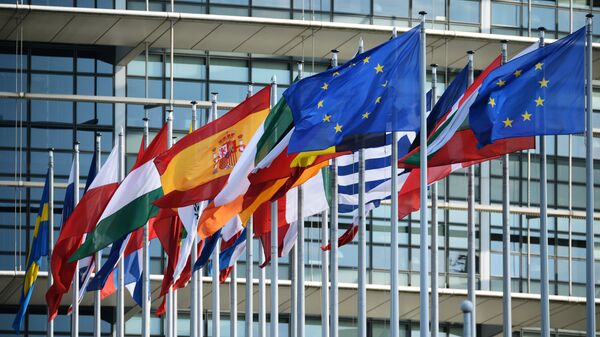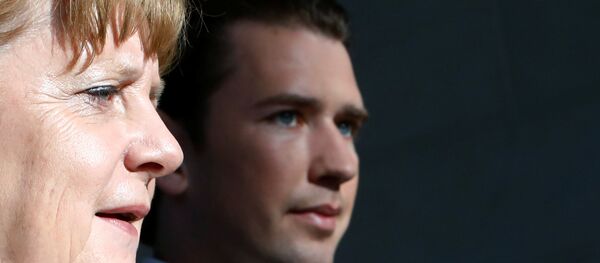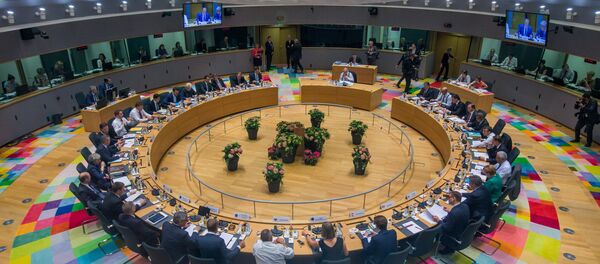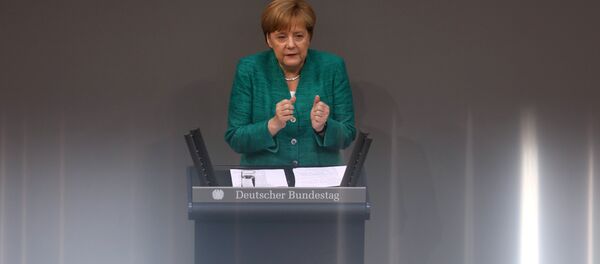Sputnik: Donald Tusk has warned that the EU has to prepare itself for the worst with regard to the bloc’s relations with the US. How do you see ties between the two allies playing out in the future?
Iain Begg: I think what’s happened here is that the EU or Europe in general has been used to a fairly benevolent United States. Benevolent on looking after Europe’s security, benevolent on having a rules-based trading system and a certain incumbent of 1600 Pennsylvania Avenue is now much more aggressive, assertive and belligerent in his approach. European leaders are having to accommodate to this very different way of doing international relations and that is part of what Tusk has been warning against. I think this could be badly wrong, particularly if a trade war erupts.
Iain Begg: The way to look at it probably is that Trump’s approach is doing deals. He lives by doing deals, he wants a deal. So what he’s doing is using the US’ economic power to try to get a different deal with his trading partners. He’s attacked China, he’s attacked Canada, he’s attacked Mexico; he’s also attacking the EU. He’ll be satisfied if he gets a realignment of the trading relationships which allow him to claim a good deal of the sort we have heard so much of. I suspect that’s the way it will unfold rather than being a full-scale trade war that means Europe being cut off from the US and vice versa.
Sputnik: Give us your take on the relations between the US and the UK. Theresa May seems to be under the ponders in terms of maintaining a decent relationship; she’s very much the underdog when it comes to this relationship. You use the word “benevolent,” that’s very much the case in that relationship isn’t it?
Iain Begg: I think what’s happened with the UK is that although there’s an expectation in the UK that it would be straightforward to have a trade deal with the US following Brexit, the reality is now kicking in. This is going to be a very long-drawn process and particularly with Donald Trump’s rhetoric and some of his actions, doing a trade deal is going to be something that’s going to take a huge amount of effort. And let’s face it, for the US the UK is only a relatively small part of the bigger European picture and indeed a bigger global picture of the realignment of relationships. So the UK is a supplicant, May is not in a strong position to make big demands. That’s said, I think it’s fairly clear that Trump has an equal opportunities approach to insulting people: he’s happy to insult anybody.
Iain Begg: I think we’ll see progress on it, but not a comprehensive solution. And that’s because a comprehensive solution requires action in a whole range of different areas – there’s a security question about controlling the inflow of migrants, sometimes associated with terrorist threats. There’s a burden sharing dimension to it, where Italy and Greece as most prominent points of entry object to the fact that other European countries are not willing to share the burden of dealing with migrants. There’s a domestic politics dimension to it, which we see playing out very strongly in Germany, where Merkel’s under intense pressure, maybe heading towards the end of her tenure as chancellor because of the domestic opposition to the inflow of migrants. And then you have big part players in this, such as Austria under its new Chancellor Sebastian Kurz and recalcitrance of the countries of Central Europe, Hungary in particular, but also Poland and the Czech Republic. There’re layers of this problem that have to be resolved. To believe that this will be settled in the next two days is far-fetched. Instead what I expect to see is an attempt to put in place a series of initiatives and also to delegate to, let’s say Donald Tusk or Jean-Claude Juncker, to try to find a way forward over the next 18 months to two years to resolve the many different dimensions of the migrant problem.
Iain Begg: On Brexit, the big surprise is just how united the 27 member states have been vis-à-vis the UK. I think the UK was counting on the fact there’d be divisions and hoped that it’s withdrawal from paying into the budget over the next few years it would be one of the incentives for getting other countries the good deals. But the unity of the EU in relation to Brexit has been staggering; it’s almost unheard of to be so united on what is one of the big issues. What’s also happened in parallel is that the EU is confronting a series of things that have to be resolved. We’ve already discussed the migration challenge, there’s a further one about the future reforms of the Eurozone and then you have the populist movements in many countries which are a political challenge. So all of these things are on the agenda at present. From Germany’s point of view, the UK and Brexit was maybe no. 5 or 6 on the agenda of German politicians, it’s now moved down to no. 6 or 7 after the failure of the German football team.
Sputnik: British Prime Minister Theresa May’s set to convince, or it seems she’s set to convince her European counterparts, that Brexit will go ahead as planned, however Mrs. May’s facing this continuance of pressure within her own party vis-à-vis Brexit. In your view, how successful will she be?
Iain Begg: The Brexit date of the 29th of March 2019 is still in everybody’s mind and still likely to happen. What’s much less clear is what happens in the transition thereafter up to the end of 2020 and then in the long-term relationship and it’s there where the infighting inside the British Cabinet is so damaging, because the other side, the EU 27 side, cannot quite see what Britain wants.
The views expressed in this article are those of the speaker, and do not necessarily reflect those of Sputnik.






